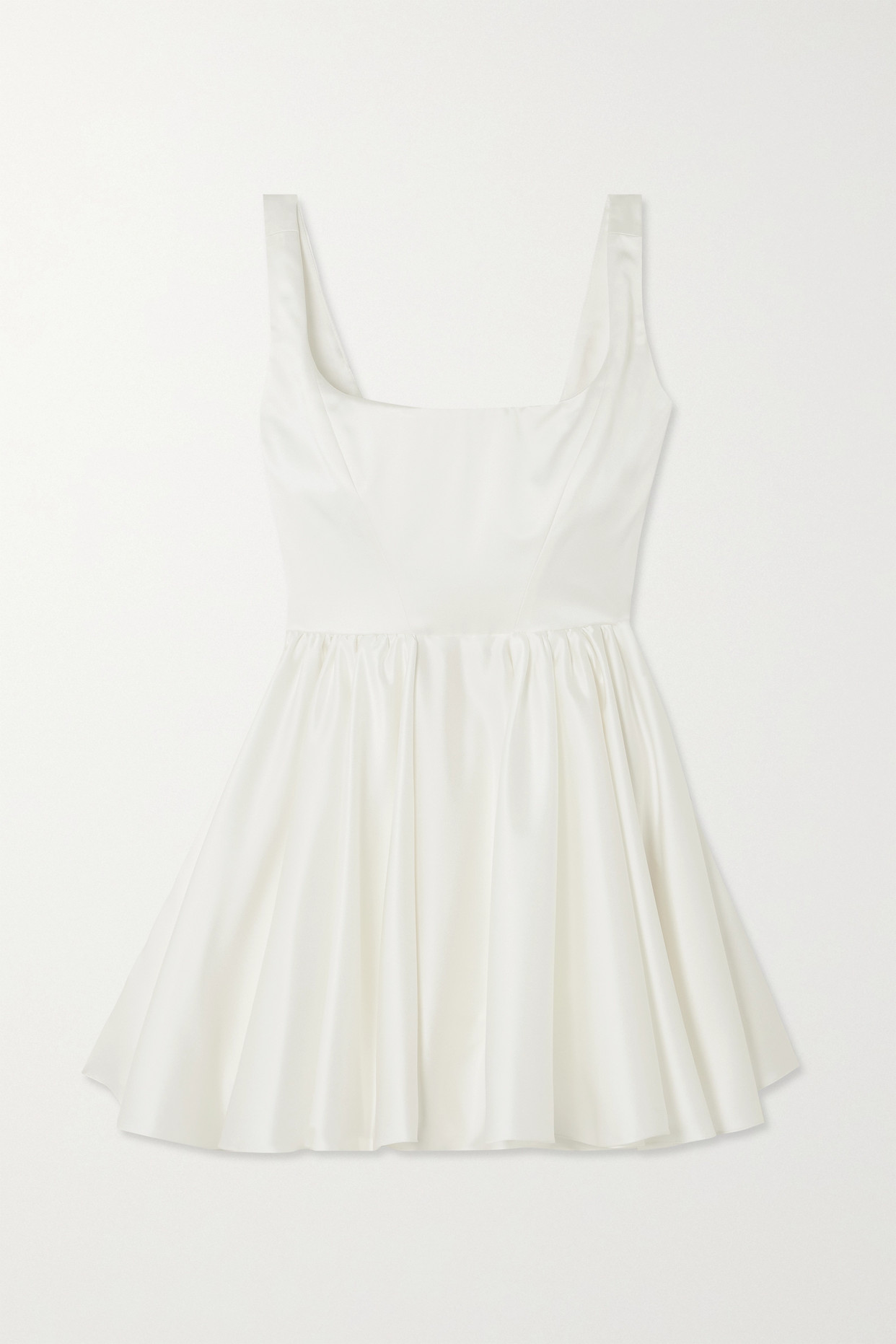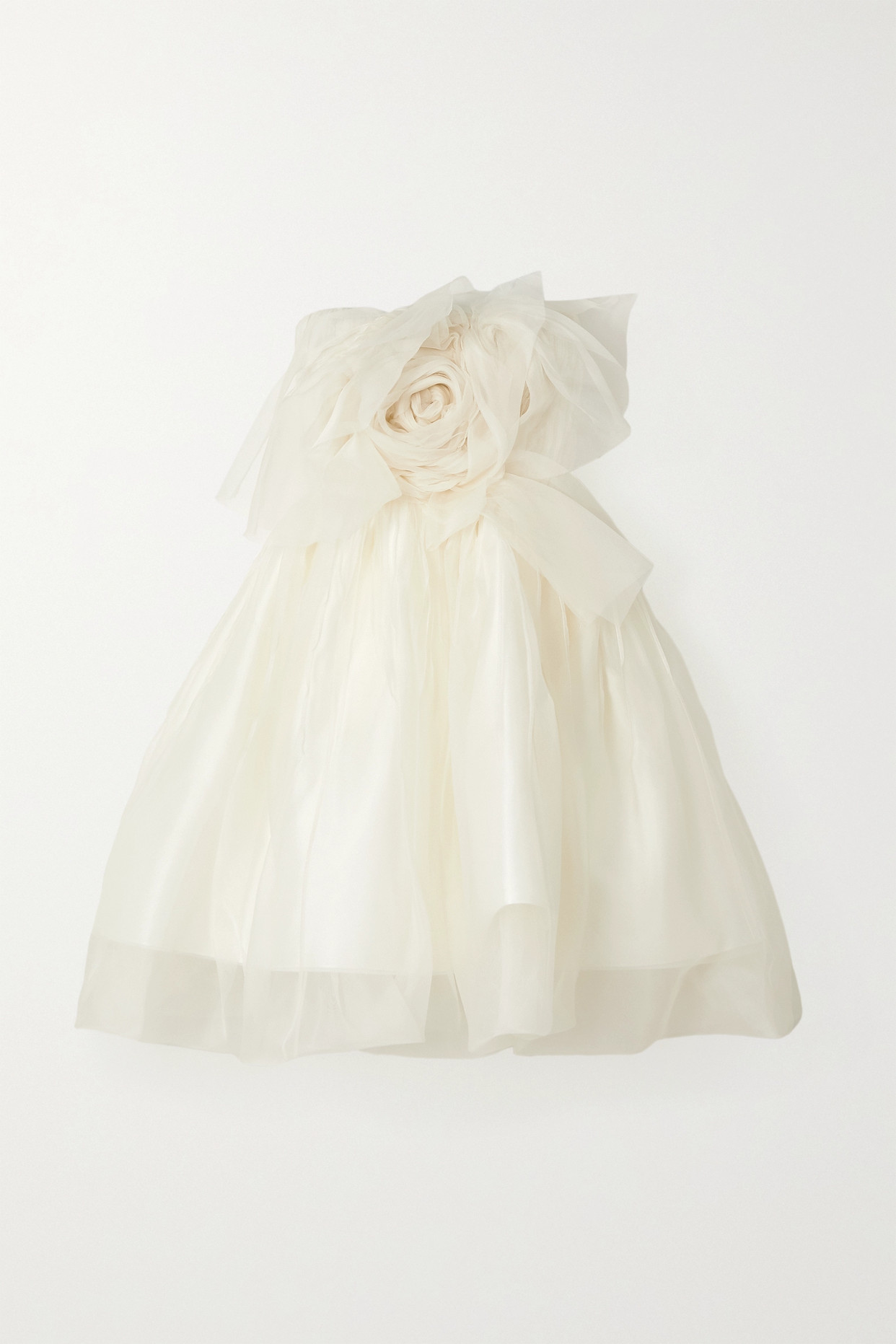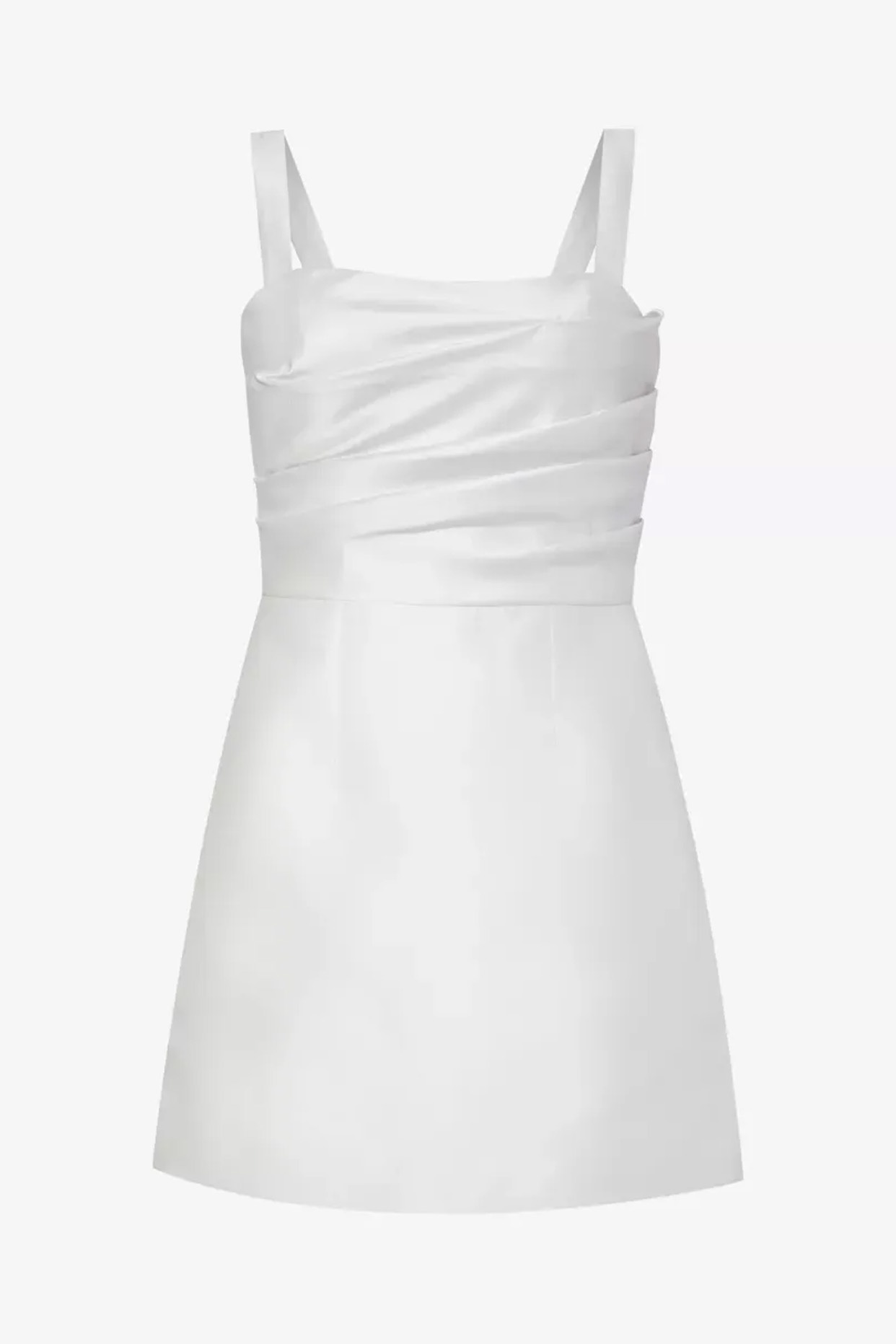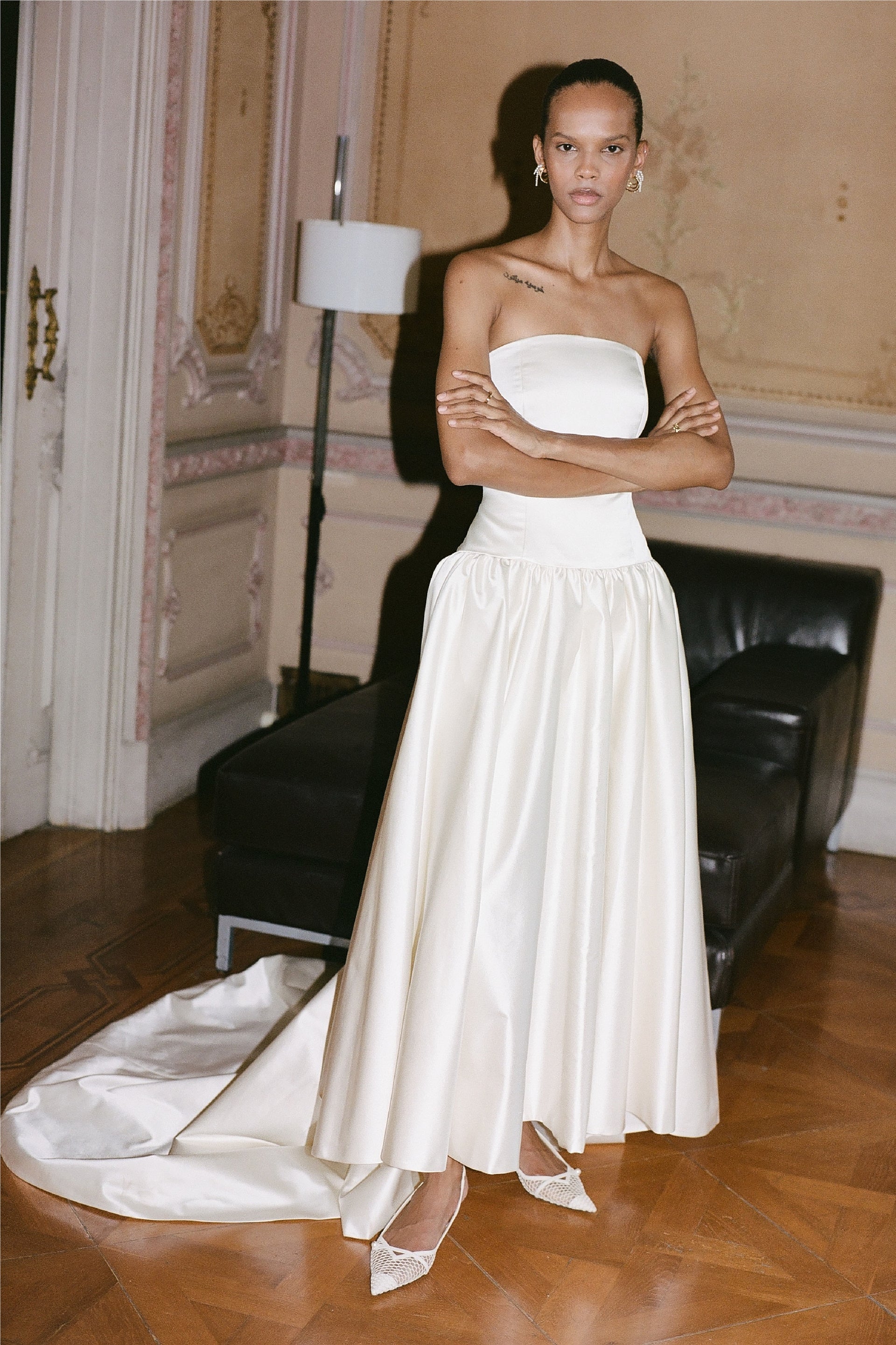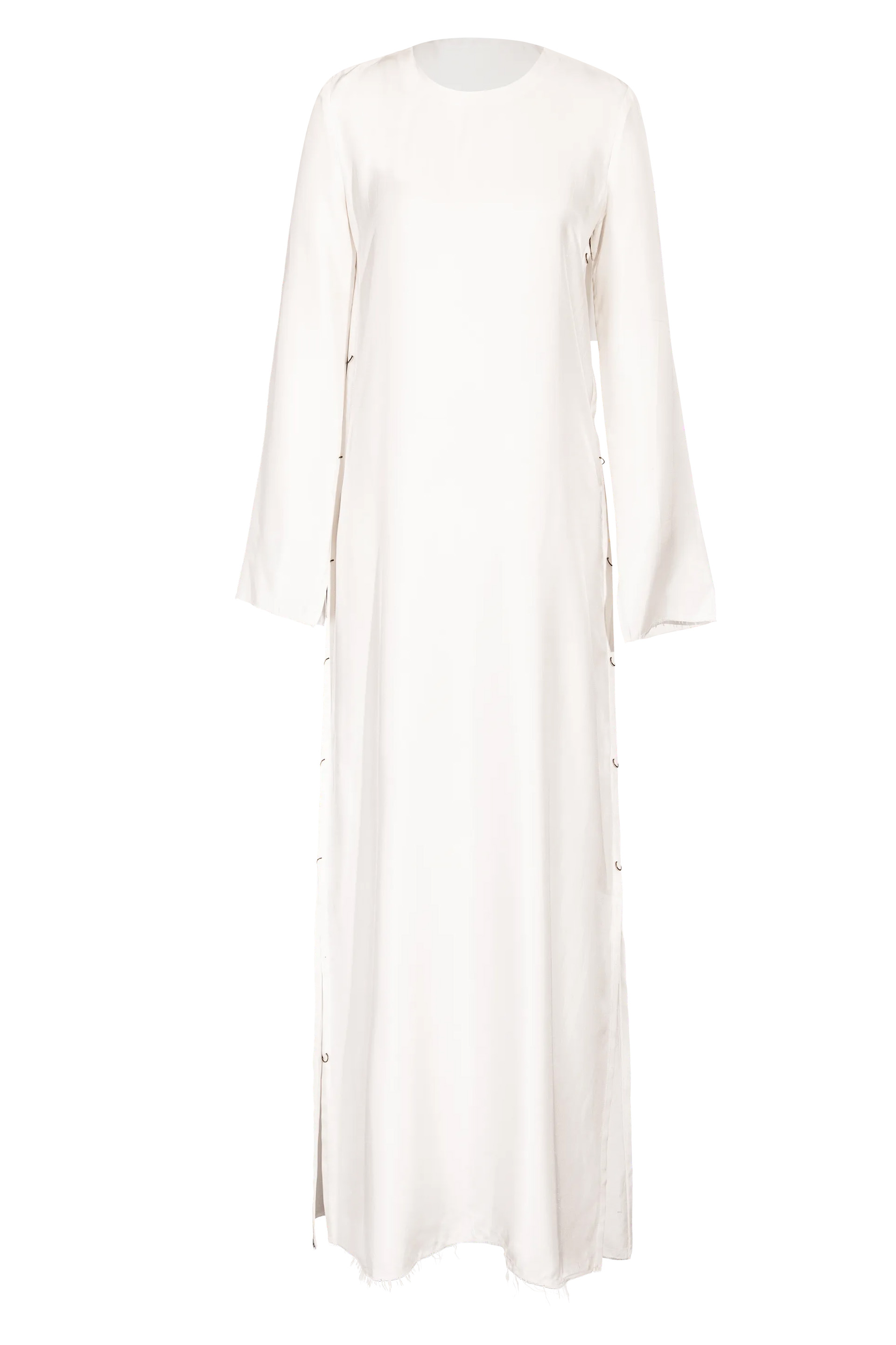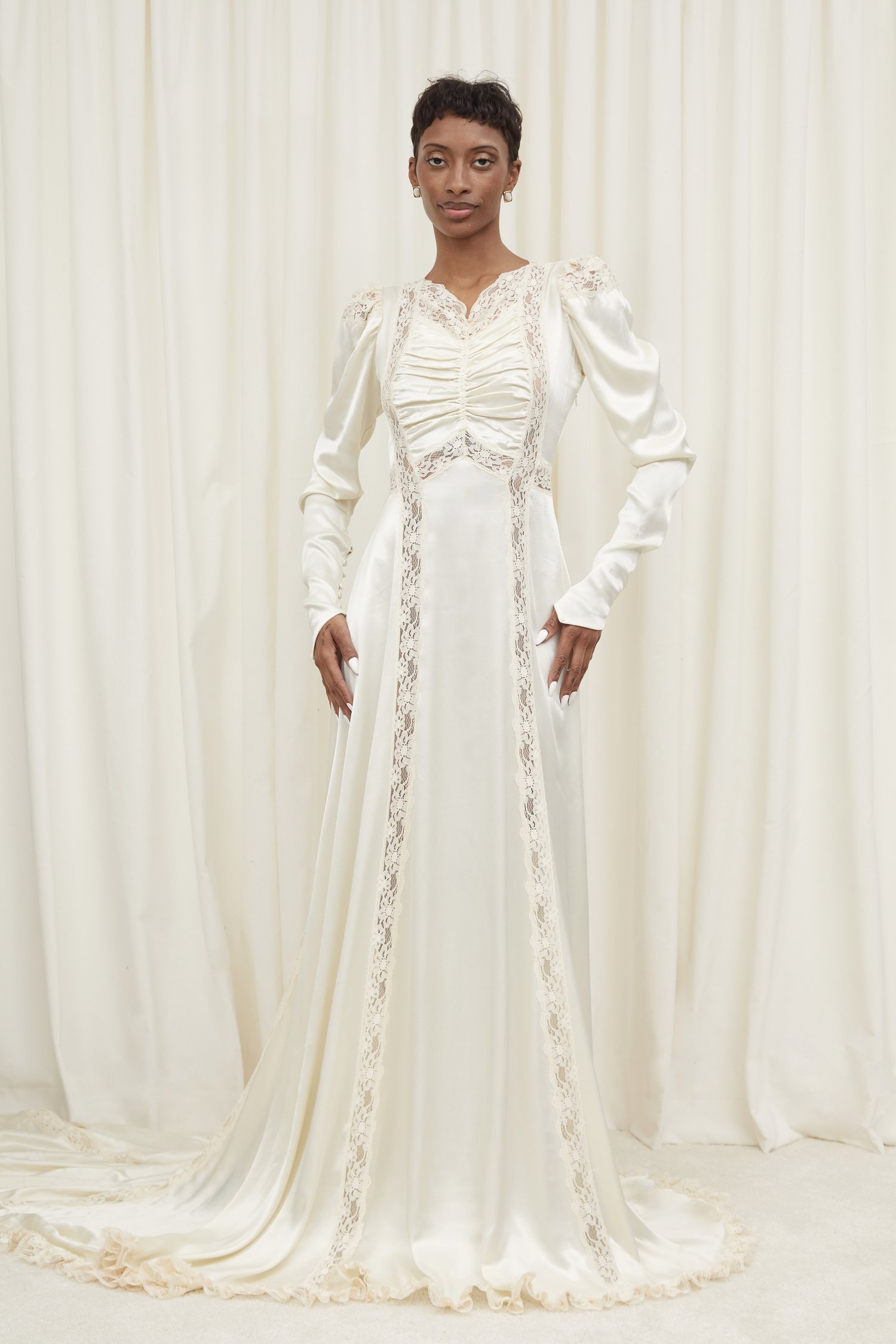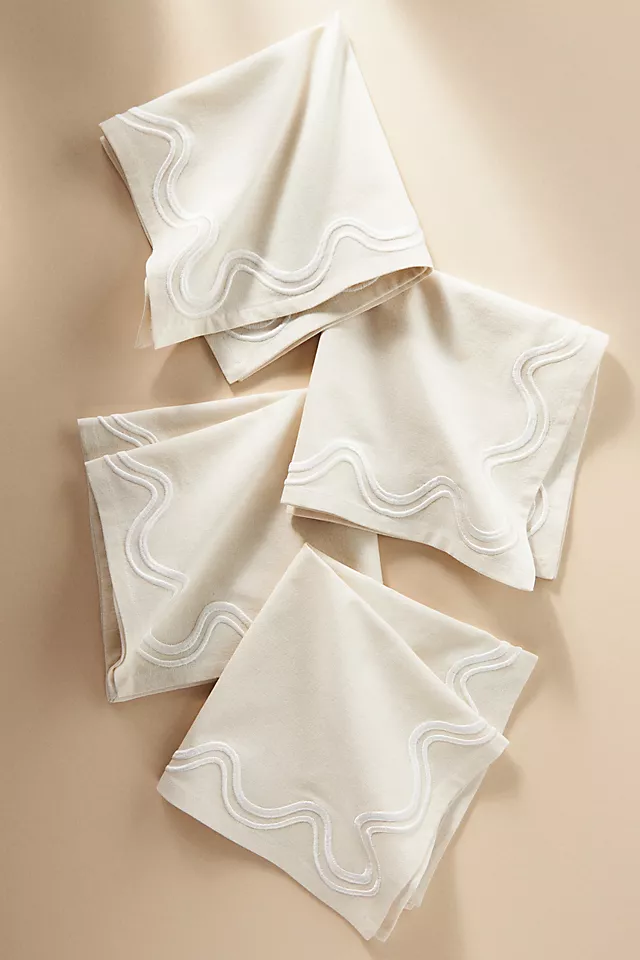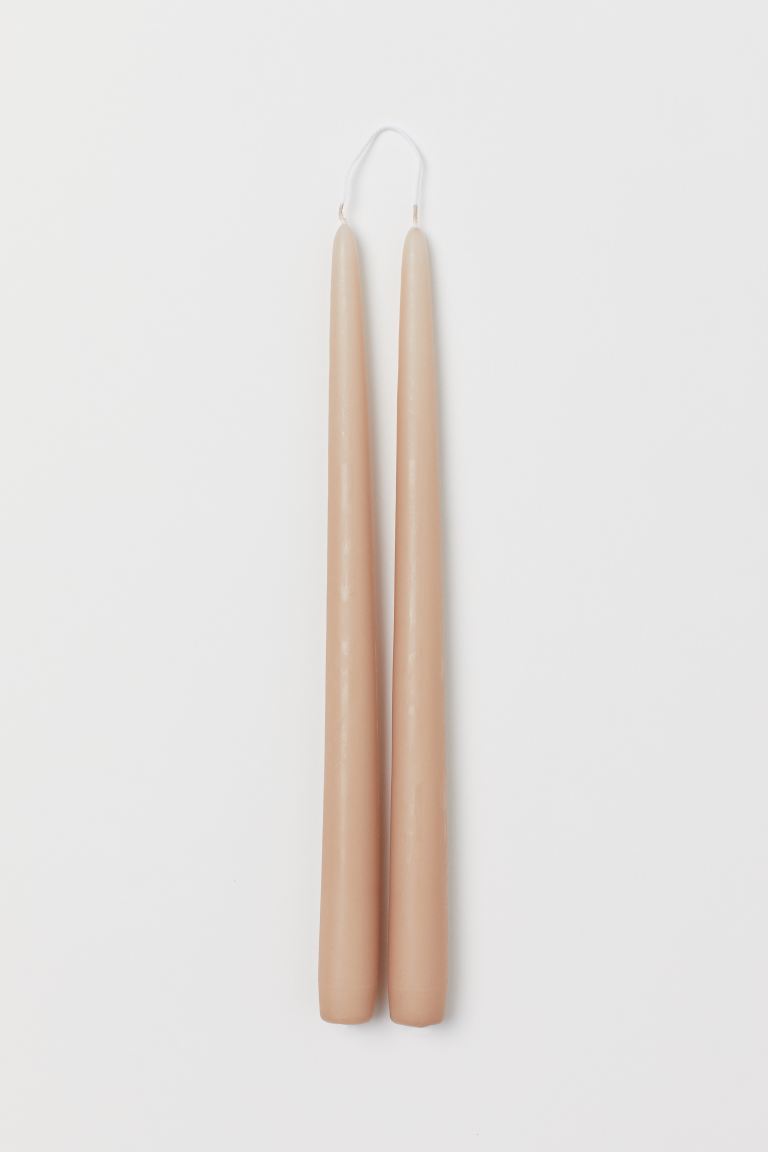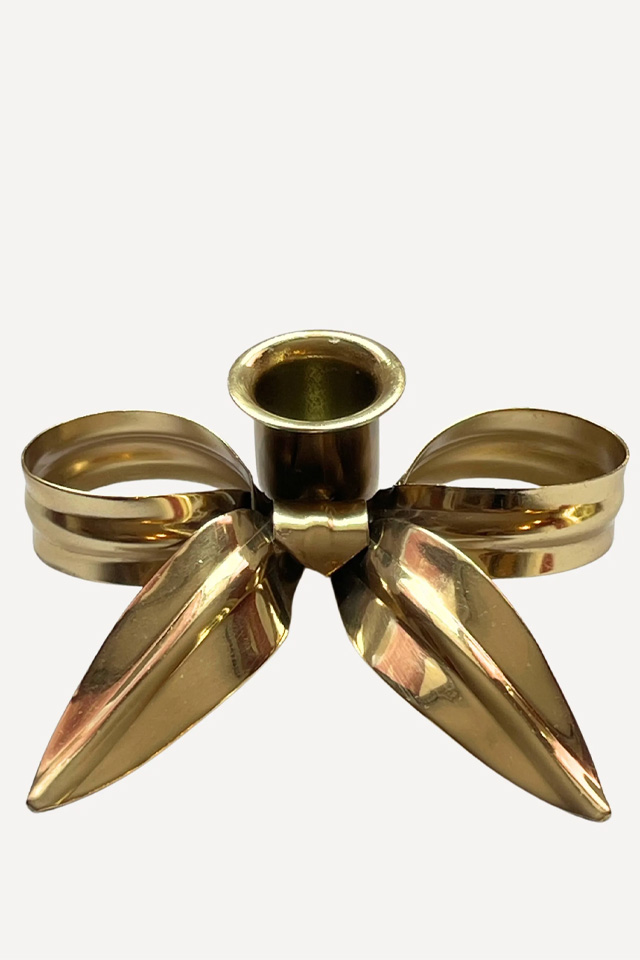The Experts Have Spoken: These Are the Major Trends Defining 2024 Weddings

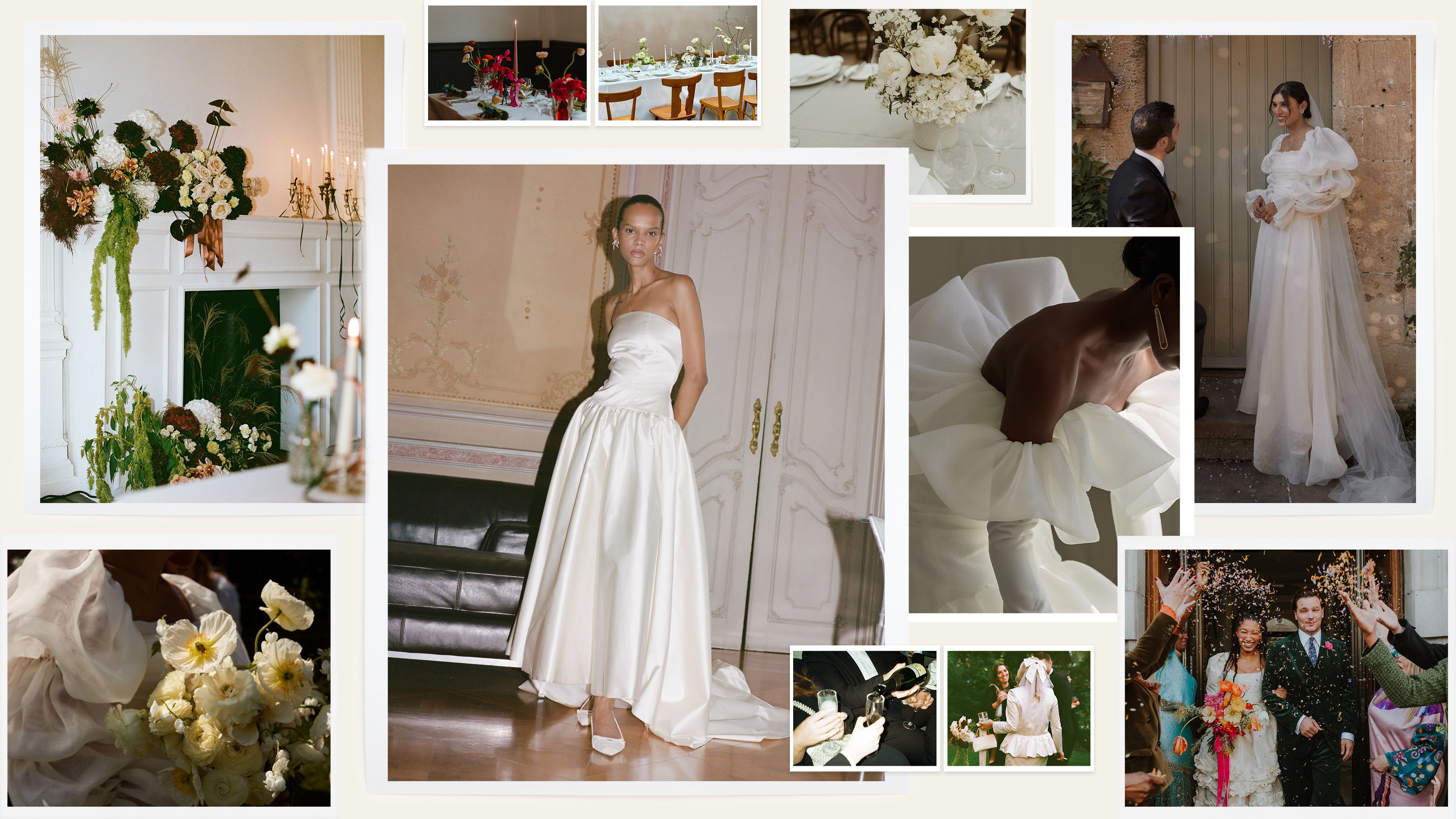
Anyone who has watched Bridesmaids or Father of the Bride will know that a wedding can be filled with traditions and expectations, but since the pandemic, there has been a shift in how engaged couples are approaching the planning process. The focus needs to be on celebrating the love between you and who you are as people. The "non-wedding" wedding has become a buzzy term in the bridal industry, reflecting this less formal attitude. Every wedding supplier and expert I spoke to for this story emphasised that you should try to forget all the "rules" and decide what traditions and cultural elements feel right for you as a couple.
"Couples are ditching the traditions and opting for a more personal approach to their wedding day," says luxury wedding and event planner Tom Couch. "A lot of people are tired of the standard format and are mixing it up, with less time focusing on the ceremony and reception and putting more energy into the 'party' and people having a great time." The Pinterest X Zola 2023 Wedding Trends Report revealed that last year, searches for "anti-bride wedding" had increased by 490%, and "non-traditional vows" by 205%.
This trend towards more relaxed weddings has led to a flurry of creative ceremonies that provide plenty of new ideas and formats for couples to consider. Bridalwear has also become more design-led and modern, with a host of brands like Cawley Studio, Molly Goddard and Own Studio offering something new for brides who don’t want a "princess" dress. "Feeling bridal has nothing to do with a particular style of dress, but everything to do with the emotion wrapped up in that garment, so be yourself—whether that's in a ballgown, trouser suit or minidress," advises luxury British bridalwear designer Kate Halfpenny. "The key to finding your perfect wedding outfit is choosing a style that makes you feel like the very best version of yourself."
I spoke to florists, wedding planners, celebrants, wedding dress designers and more to find out what themes they are most excited about for 2024 weddings, and the overall mood was an emphasis on togetherness and originality. From sculptural floral arrangements to dress codes and surprises in the ceremony, below you’ll find plenty of inspiration for a stylish and truly heartfelt wedding.
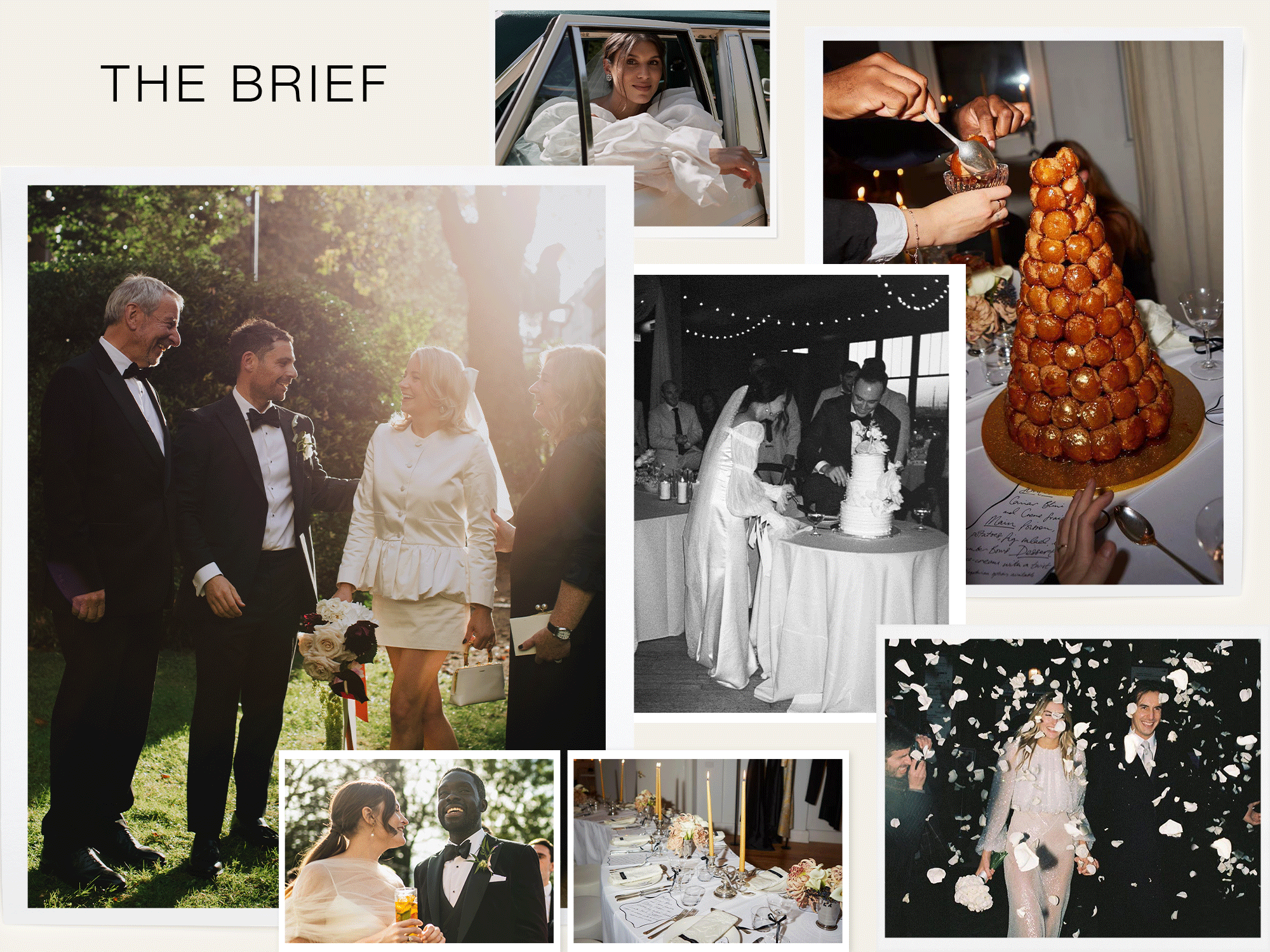
1. Non-Wedding Weddings
"People don’t want 'cookie cutter' weddings anymore; it’s all about individuality and hosting a totally unique event," says Rosie Williams, co-founder of bridal label The Own Studio. "There is a trend towards the 'non-wedding' wedding, where couples are creating their own formats and traditions. There’s no one way to celebrate."
Humanist celebrant Nat Raybould recommends questioning every tradition to decide if it actually works for you. "Even if you are the most forward-thinking, independent couple, once you start wedding planning there will be a lot of 'shoulds' that enter your mind that are only there because of countless weddings you will have seen on TV and in films, attended in person or heard about through anecdotes. Don’t let those 'shoulds' sneak through without question!" she says.
"All your wedding ceremony needs to include are promises of love and commitment. Everything else can be leaned into or popped in the bin, depending on if it means something to you both. You don’t have to have wedding parties and you don’t have to wear traditional wedding outfits. You don’t have to stick to traditional aisle entrances; you don’t even have to exchange rings if you are not jewellery people. You can choose to go traditional, but the word 'choose' is the key—do it only if it makes your heart sing."
Shannon Lawlor, executive beauty editor at Marie Claire, is getting married this spring. She and her husband-to-be decided to structure their celebration in their own way. "For us, the decision to get married was about the legal bit of paper that binds us, rather than a religious act or a big wedding ceremony," she explains. "As a result, we have decided to separate the 'marriage' from the 'wedding'. We're signing the papers at the town hall (both in our usual uniform of jeans and a T-shirt) with six of our best friends, and then we're throwing a big party the following day to celebrate our love.
"We spoke with our families and explained to them that for us, the paper signing is just admin that we want to be as stress-free as possible." For their celebration, Lawlor will wear a wedding dress and the couple will make speeches to each other instead of saying traditional vows. They will exchange rings in front of their guests before eating pizza. "We didn't want a sit-down meal, any photographers or a big ceremony, so we’ve done it our own way. It’s caused some confusion and takes quite a lot of planning, but we’re so grateful that no one seems to be that upset by our decision (that we know of, anyway)!"
2. Get Creative With Your Venue
Purpose-built wedding venues can be a brilliant choice because the staff know how to run all aspects of a wedding smoothly and often have a team of experts on hand to help guide decisions. However, cultural spaces can also be a beautiful option for creative couples. "A trend I have been seeing is couples choosing to hold their weddings in places that are not traditionally seen as "wedding venues", such as art galleries, theatres and museums," says Raybould. "These are usually picked by creatives who want to get married in a place that means a lot to them as a couple, and also because they want to support a venue that performs a public function, rather than existing only for weddings and events. These couples love the idea of their money going towards supporting the upkeep and onward life of a public service, and so they are therefore supporting art, culture and society as part of their celebrations."
Film directors Raine Allen-Miller and Freddie Waters, for example, got married at Lambeth Town Hall in London with lunch at The Camberwell Arms, walking past The Ritzy Picturehouse in Brixton where their names and wedding date were emblazoned on the front of the iconic cinema. Actors Ophelia Lovibond and Henry Pettigrew, meanwhile, got married on stage in front of a gospel choir at Wilton’s Music Hall in East London.
3. A Meal to Remember
When it comes to city weddings, many couples are opting to host their receptions in restaurants instead of grand wedding-venue dining rooms or hotels. The 2024 Pinterest Wedding Report notes a 150% increase in searches for "wedding dinner party", which can either be hosted in your favourite local restaurant or an iconic foodie hotspot. Actors Bel Powley and Douglas Booth got married at Petersham Nurseries in Richmond, London last year, whilst Spring at Somerset House is a timeless and romantic choice for a smaller guest list. St. John, Bistrotheque and Bistro Freddie (all in London) have a modern take on fine dining, with white starched tablecloths, silver platters and lots of natural light (ideal for photographs)—creating a minimalist vibe that requires little dressing.
With a simple backdrop, your food choices can be as aesthetic as any floral display, whether piles of whipped butter, platters of truffle chips or an exquisite dessert trolley. "Food styling is definitely a key part of the overall styling of the table," says Anna Singleton, founder of The Table Edit. "I'm seeing tables using either minimal or no flowers, and clients wanting a more 'editorial' feel to their day are opting for sculptural displays of fruit, vegetables and other food items such as bread and butter instead."
And foodie couples are eschewing traditional three-tier cakes—Singleton says she is seeing lots of "'wow moment' desserts" like "piled high croquembouches, cakes and other desserts that have an architectural feel, or XXL tarts and cheesecakes that take up an entire table." At fashion PR company founder Daisy Hoppen’s wedding, clementines filled with sorbet (a dessert served at restaurant Session House) added a pop of colour to the white tablecloths. "Equally, hand-painted menus will be replaced by simple fonts by those wanting a chicer, more 'restaurant' feel," adds Singleton. Anyone who has watched The Bear and admired Carmy’s white T-shirt and navy apron combo will know that the waiters' outfits can also add to this aesthetic.
4. Forget the Hierarchy
Weddings can be a political minefield, from sorting the seating plan to choosing who to have as a bridesmaid. However, you can forget all of that and try to make it a hierarchy-less day. "Couples now don’t see their wedding as just a celebration of only themselves; they also see it as a way of celebrating everyone in their lives—their families and friends," says Raybould. "This means that I have curated so many ceremonies in the past year or so which actively involve so many guests in a myriad of roles, and I have been centring the ceremony language to emphasise how much the couple value the communal love and support that is surrounding them."
"Post-pandemic times have really left this mark on us all: that we should value those loved ones who are around us and not take them for granted." One symbolic way couples are achieving this is to perform ceremonies in a circle, rather than rows, with guests looping around the couple. "To me, this stems from the same reason. When everyone is surrounding the couple, there is no 'front row' or hierarchy of importance. Everyone is equally valued, honoured and appreciated," she adds.
5. Stretch Out the Weekend
When it comes to destination weddings, couples are adding more events to the schedule to maximise the time spent together with their guests. "We’re finding couples are really looking to create meaningful experiences, in some cases placing almost as much emphasis on rehearsal dinners and farewell parties as much as the day itself," says wedding planner Catherine Bradfield of The Wedding Boutique Italy. "It's more and more about enjoying human connection and celebrating togetherness than we have seen before. This feeds through into photography styles, as more and more couples seek candid imagery as opposed to the more editorial styles that have dominated over the past five to 10 years."
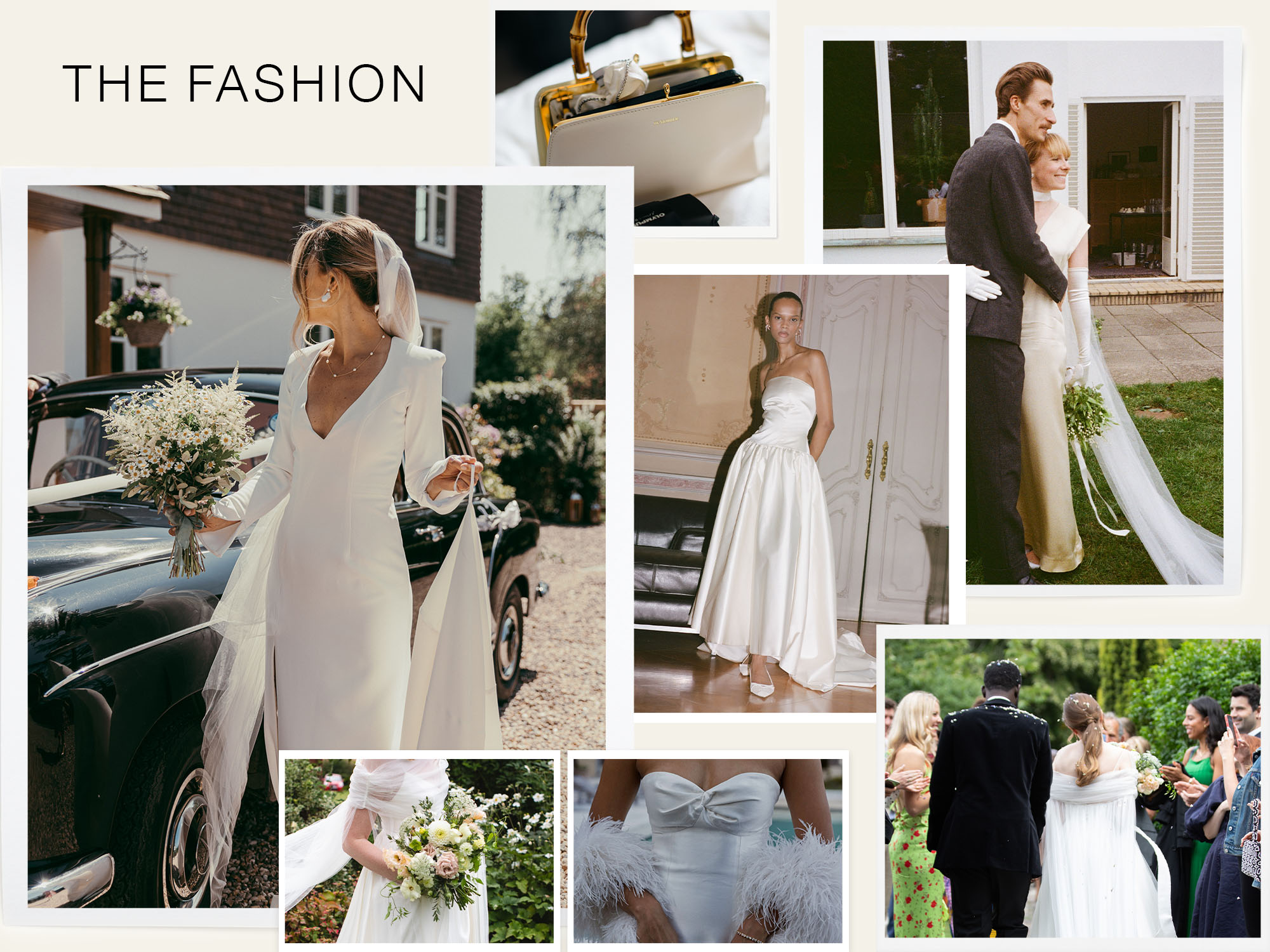
1. Something Borrowed
Traditionally, brides wear something borrowed on their wedding day, however, with the boom of the rental market, this is no longer just about borrowing a pair of earrings or a bracelet from a family member. At P.S. Bridal you can rent all aspects of your wedding look, including ceremony gowns from Vivienne Westwood, Own Studio and more. Ella-Louise Andrew, co-founder and CEO, explains why ownership is becoming less important for brides when looking for The One. "We make it super easy for brands and brides to list and rent their items, much like the AirBnB of wedding dresses," she says. "Rental has only recently become widely popular, with rental and resale growing at four times the pace of traditional retail, and it will soon become the new normal."
Not only is it a more sustainable option, but it also enables brides to consider designers outside of their budget. "Rental allows brides to access their dream dress at a fraction of the price, rather than settling for a lesser alternative to purchase new," adds Andrew. "They no longer have the same emphasis on owning the dress, they are more excited to wear that dream dress for one day and are happy to return it after." Rental platform Hurr notes a 150% increase in bridal bookings year-on-year, whereby brides rent pieces for the entire wedding weekend, from the rehearsal dinner to the party dress and the post-wedding brunch. In terms of specific rental trends, Hurr has seen a fivefold increase in "bridal bows", "something-blue accessories" and "pops of colour" for the dance floor.
2. Short and Sweet
Sofia Richie Grainge had a series of Chanel couture gowns for her South of France nuptials, however, it was her party dress that really won fashion editors' hearts. The structured minidress with a camellia flower on the bodice was a remake of a dress Claudia Schiffer wore on the Chanel runway in 1993. "Minidresses are hugely popular—almost everyone has one as a second look—but now we are seeing more brides opt for a mini for their main look," says Annelise Sealy, founder of The Fall Bride.
One of these brides was Who What Wear UK’s senior fashion and beauty editor for branded content, Rebecca Rhys-Evans, who wore a Liberowe miniskirt suit to her London ceremony. "I always thought I’d wear a long, voluminous dress for my wedding, but I couldn’t find a single dress online or in bridal stores that came close to my love for this two-piece," she explains. "The peplum detail on the jacket, the way the light bounced off the duchess silk fabric, the short-short skirt—I just loved it. Our official ceremony was at Marylebone Town Hall, and I really wanted a "city wedding" bridal outfit for it; something classic and chic but not over the top, and definitely something I could wear again. I’m a sucker for tailoring and a short skirt and a huge lover of vintage silhouettes, so I guess it shouldn't have come as a surprise that the moment I put it on, I knew it was what I was going to get married in."
3. The Rise of Bespoke
Once upon a time, bespoke bridal was only an option for the likes of heiresses saying "I do" in six-figure couture masterpieces. However, more contemporary and fashion-forward labels are now offering bespoke services, enabling brides to design a personal look. Copenhagen-favourite Cecilie Bahnsen has just launched a made-to-order service, enabling you to purchase older styles from previous collections, whilst Molly Goddard offers a full bespoke service from its studio in Bethnal Green, where the designer personally signs off every dress. Central Saint Martins graduates Amy Trinh and Evan Phillips founded Wed Studio to offer a contemporary, alternative approach to bridalwear, and although it does offer ready-to-wear, bespoke is the heart of the business. The duo offer a playful take on bridal, with lots of ruching, volume and bows and an emphasis on construction.
"As weddings become more individual, more and more of our brides are looking for a custom look and something nobody else has ever had before (or will again!)," says Rosie Williams, founder of Own Studio, who worked with India Cardona of the India Edit on her fully bespoke gown. "We offer a semi-bespoke service where brides can customise one of our existing styles, as well as a fully bespoke service where we start with a blank sheet of paper and create something together," she says. Unsurprisingly, brides love how personal and unique a bespoke dress can be. Williams adds, "Having a bespoke dress is almost like a fingerprint; every cut, stitch and fold has been made especially for you, crafted and fitted to your body, and it can never be replicated. There's something magical about that."
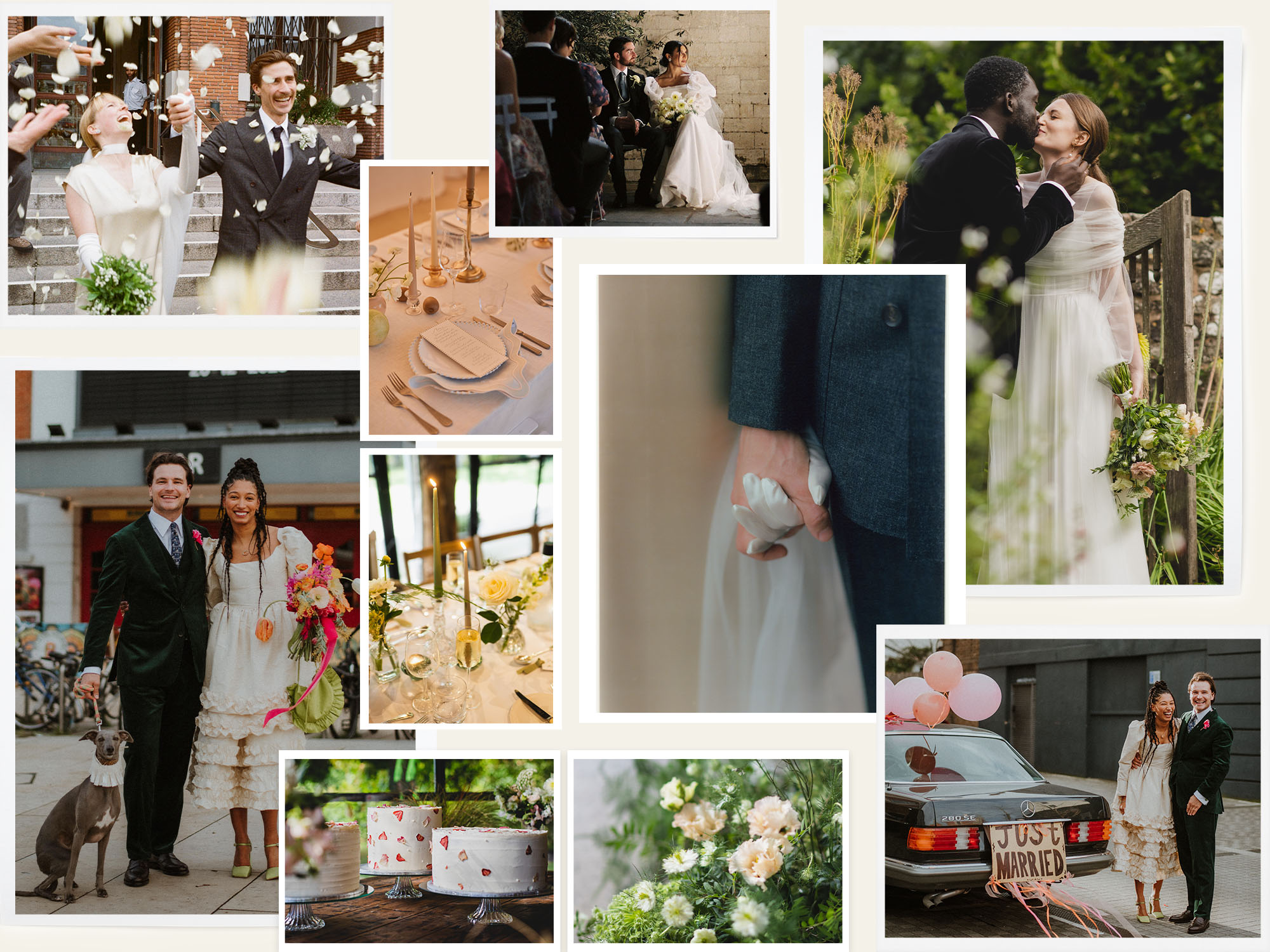
4. A Surprise Transformation
There has recently been a rather alarming trend of brides getting a dramatic haircut in the middle of their wedding day, but you don’t need to get a pixie cut during the canapés to create a moment to remember. "More than ever, brides want to have those 'wow' moments, so we’re finding our statement overskirts are more popular than ever," says Halfpenny. "Brides love choosing a timeless, classic look to walk down the aisle in, then all of a sudden that beautiful overskirt comes off and it looks like a completely different dress, or the other way around; start with a slinky dress and add elements throughout the day. Whichever way you choose to go, make that transformation major."
5. Drop the Waist
One thing I kept hearing when speaking to bridal experts for this story is that for 2024, it’s all about the drop waist, and Molly Goddard and The Own Studio in particular have both leant into the silhouette. "Drop waists are back in a big way, inspired both by Victoriana and '90s Dolce Gabbana references," says Sealy. "You may think this silhouette isn't for you, but with the bodice structure it is flattering on all figures." Instead of soft and fluid shapes, this is about more structure and volume. "This year, it’s all about sculptural and dramatic silhouettes that still feel fashion-led and fresh," says Williams. "Drop waists are firmly in this year, as are more voluminous hems like the bubble hem, which features in our latest collection," she adds. "Structured fabrics are in favour right now, with our brocade and duchesse satin gowns being amongst our most popular."
6. Traditional Touch
Put a new spin on "something old" with a vintage wedding gown or archive runway reference. According to The 2024 Pinterest Wedding Report, there has been a 420% rise in searches for "'70s vintage wedding dresses" and a 240% increase in "vintage-inspired wedding dresses". At Princess Beatrice’s wedding in 2020, she loaned a vintage Norman Hartnell bridal gown from the late Queen, leading to a direct spike in searches for vintage bridal.
It helps to start with an idea of designers and eras you love, to narrow down your search. Fashion buyer Georgina Eklöf-Grey found her secondhand wedding dress on Tab Vintage; a champagne-coloured silk slip dress from Celine's Phoebe Philo era, whilst Erin Cunningham, a fashion editor who now works at Meta, encouraged her entire bridal party to wear "something old". For her dress, she chose a rare Chanel caped gown that Jerry Hall wore on the runway in 1985, which she found on Shrimpton Couture, a site run by incredibly knowledgeable vintage dealer Cherie Balch.
7. Guest Dress Codes
When it comes to bridesmaid dresses, there has been a move away from everyone wearing the same matching dresses, with bridal parties instead wearing a mix of colours, fabrics and prints. "This trend allows you to celebrate each individual within your squad, playing with different shapes and fabrics," says wedding planner Catherine Bradfield. "It'll be easier to ensure they are wearing a dress that makes them feel fabulous!"
However, at the same time, there has been a rise in specific dress codes for guests, which tends to get a mixed response. "Couples are now telling their guests what colours to wear so no one spoils the group shot," says Tom Couch, luxury event and wedding planner. "I think it’s clever but I know how much anxiety it can cause guests. WhatsApp groups are starting up everywhere full of guests panicking about what dress codes mean."
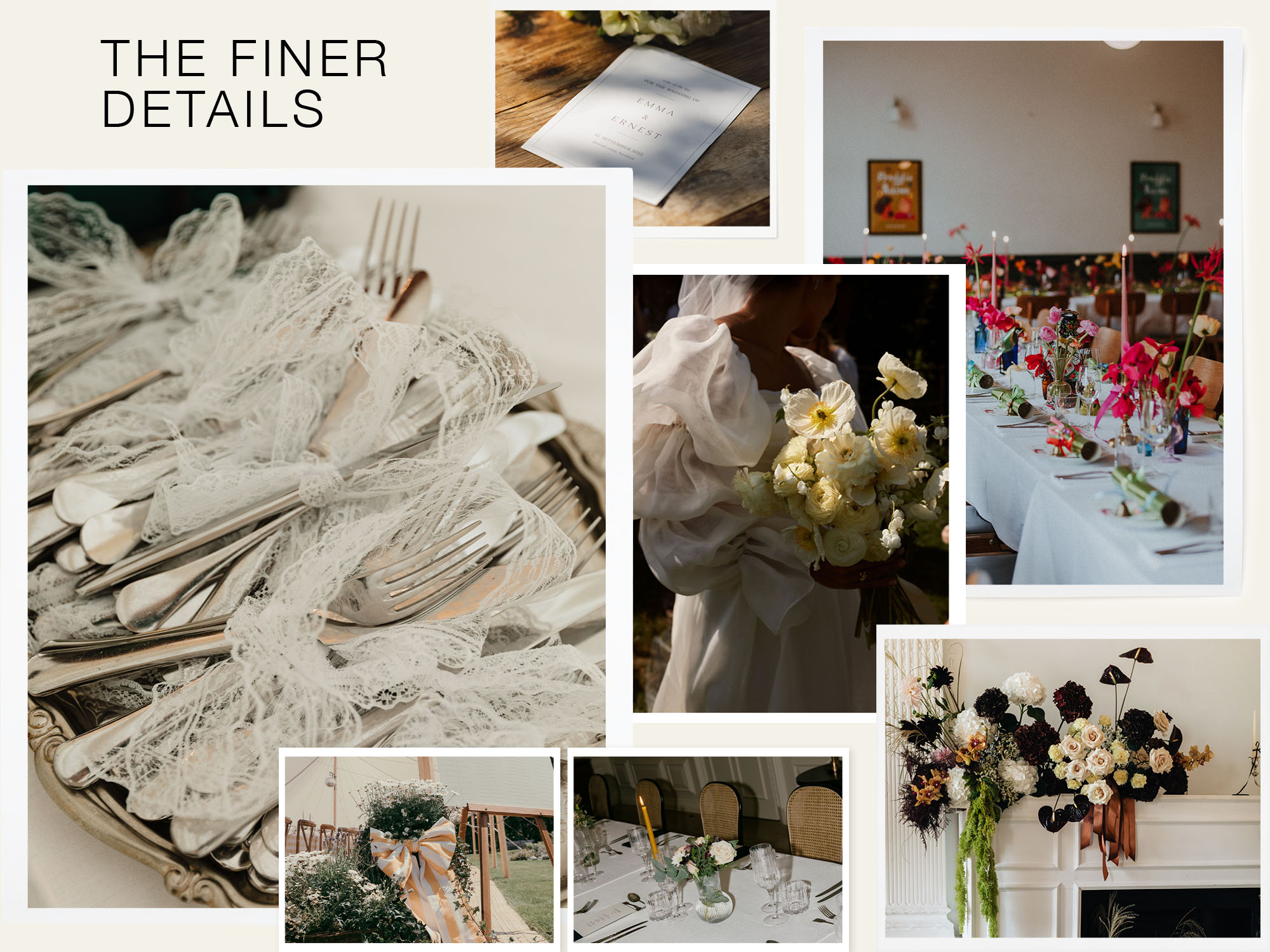
1. Surprises in the Ceremony
Couples choose humanist celebrant Nat Raybould because she creates a very personal wedding ceremony. However, she has noticed that couples now want every word to be intentional and reflective of them. "I have noticed that my couples are increasingly keen to add even more personality to their ceremonies, so instead of picking wedding readings from books or the internet, couples are increasingly choosing people for the roles first, and then asking them to create something especially for the ceremony,” she explains. “Whether that’s a poem, a small speech, a presentation complete with explanatory diagrams (yes, really!) or even a song, these are also often left as a surprise until the ceremony itself, which makes the moment a real gift to the couple."
2. Keep Things Simple
Weddings can be a big production, but you don’t need to go big on every aspect of the day. "I feel there has been a small shift towards more understated wedding elements," says Ally Voss, founder of Clover London, which makes 100% silk bridalwear. "From simple canapé catering over a formal sit-down reception, opting for disposable film photography instead of a videographer or plants and candles in lieu of statement floral arrangements, the more I talk to our clients, the more streamlined it feels their wedding details are becoming."
3. Light Up the Table
"Sustainability is becoming more important to couples. Unless they have an unlimited budget, people are opting for tables full of candlelight over tonnes of flowers," says Couch. It’s not just candles that can help light up a table, as Bradfield explains. "We’re seeing the table-lamp trend really take off. In line with creating a more intimate, romantically lit and altogether more low-key dining experience, integrating lamps into your wedding table decor is becoming a thing." She notes that whilst candles will never go out of fashion, you can match lamp shades to your colour scheme or "really push the maximalist feel with patterns, ruching, frills or tassels."
4. Modern, Sculptural Florals
"In recent years, blousy blooms and romantic foliage have been a focus, all part of the 'fine art' movement, as it’s been named," says Bradfield. "We’re now seeing the rise of more modern, slick lines, and the calla lily has made a comeback. With its malleable stem and iconic shape, it’s a stark contrast to the soft garden roses that have dominated floral arrangements for a long time."
Singleton, who specialises in tablescapes with The Table Edit, says she is seeing a lot of requests for "fresh greens and solo floral arrangements that use an abundance of one flower," she says, adding, "I love using sculptural stems that feel playful—I prefer using more interesting, unusual stems that aren’t traditionally 'wedding'. I think people have finally moved away from being a slave to the colour scheme and want something that reflects their personal style a bit more."
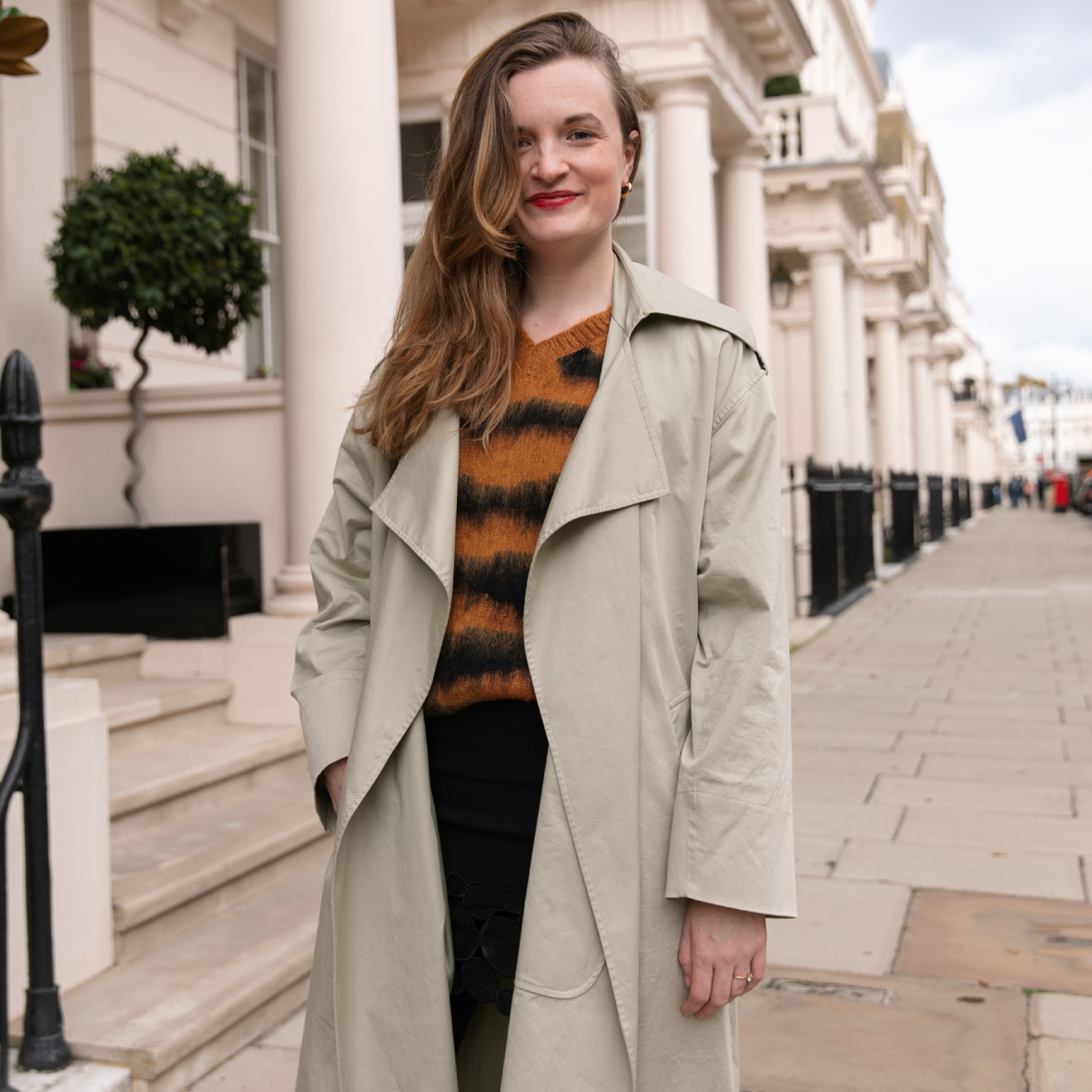
Emma is a freelance fashion editor with over 15 years experience in industry, having worked at The Telegraph, Grazia and, most recently, British Vogue. Emma was part of the founding team of Who What Wear UK, where she worked for six years as Deputy Editor and then Editor—helping shape the team into what it is today is one of the biggest privileges of her career and she will always see herself as aBest Knockoff Luxury Clothing girl, contributing to both the US and UK sites. Whether she's writing about runway trends or spotlighting emerging brands, she aims to write about fashion in a way that is democratic and doesn't promote over consumption.
